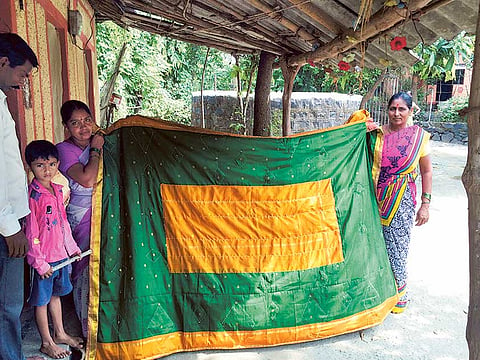Textile waste and old tyres transformed into trendy products
Mumbai-based social enterprises upcycle waste textile material

Mumbai: Upcycling may be the hot new trend since it turns trash into cash while protecting the environment.
But a group of young people in Mumbai has made it an even more worthy venture by employing men and women from marginalised communities to work in their social enterprises.
These Mumbai-based social enterprises upcycle waste textiles from tailors, garment factories and export houses to create handcrafted products such as homeware, jewellery, accessories, blankets, godhadis (patchwork quilts) and yoga mat covers. One start-up, Paaduks, not only uses old tyres and discarded rubber for soles of eco-friendly footwear but also envisions a prosperous cobbler community.
With funding from UnLtd, India, an incubator for social entrepreneurs, The Initiative, Chindi and Paaaduks, all two-three-year-old projects, are making an effort to change the lives of community members by helping them become craftspeople. These New-Age social entrepreneurs are also collaborating with fashion designers and stores, besides exhibiting their wares at exhibitions, hotels, fairs such as the Khada Ghoda Festival and selling the products online.
Quality talks
“We talk about the skills of our women and sell the products that stand out for their quality; it’s never about the social angle or their position,” says 26-year-old Arushi Aggarwal, founder of The Initiative. “We don’t want to evoke sympathy since the women take a lot of effort to create handmade products that are unique and creative.”
The Initiative currently trains and employs 26 motivated women who are seeking economic independence but unable to take up regular jobs due to lack of education and/or family obligation. A full-time employee could earn Rs6,000-Rs7,000 (Dh329-Dh384) a month, says Aggarwal who was herself trained in industrial design in Pune.
Tanushri Shukla, founder of Chindi, says: “I think people respond emotionally when they know that our products are done by women from marginalised neighbourhoods. [But] at the end of the day, people don’t buy out of pity and therefore our effort is to create a piece that is one of a kind.”
Working with craftswomen from the Mankhurd slum colony, she has encouraged the use of crochet and knitting, which she loves and says is becoming a dying art.
Besides homeware, the trendy accessories and jewellery produced from textile waste — from T-shirt producers and fashion houses — have drawn the attention of fashion designers.
Shukla likes to stress that everyone in the value chain, particularly the women, are paid fairly.
Inspired by a news story of a man in the US who bought scrap tyres from Indonesia and used them to make sandals, Jothsna and Jay Rege began scouting in the dingy alleys of Thakkar Bappa Colony, Chembur, and near Kurla station where cobblers, who had once migrated from Rajasthan worked.
It was then that Paaduks, derived from the Sanskrit word Paadukas for footwear, was born.
“Our footwear is made of natural fabric like cotton and jute, vegan material and soles made from upcyled rubber such as discarded tyres, and our designs are based on the latest trends in fashion,”
says Jidnyasa Butley, who takes care of sales and operations.
Cobblers, plagued by socioeconomic problems and exploited by retailers and wholesalers, are now paid a fair price for their efforts in an attempt to stabilise their financial condition thanks to the initiative.
Depending on the design given by Paaduks, cobblers can make around 500-600 sandals for both men and women in a month.



